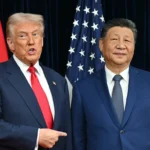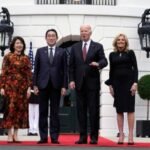In the sprawling battlefield of the global war on drugs, Mexico has emerged as an unexpected force, wielding tactics that have stymied America’s fervent efforts to combat drug trafficking and consumption. Despite the United States pouring billions of dollars into drug interdiction programs and enforcement measures, Mexico’s strategic maneuvers have consistently disrupted these efforts, leaving policymakers in Washington grappling with the complexities of international drug policies. This blog post delves into the intricate dance between the two nations, exploring how Mexico has managed to thwart America’s war on drugs.
Mexico’s Geographical Advantage
At the heart of Mexico’s defiance against America’s war on drugs lies its strategic geographical position. Sandwiched between the world’s largest producer of illicit drugs, South America, and the world’s largest consumer, the United States, Mexico serves as a crucial conduit for drug trafficking routes. Its vast and rugged terrain, coupled with extensive coastlines and porous borders, provide ample opportunities for drug cartels to operate clandestinely, evading detection and interception by law enforcement agencies.
Mexico’s geography presents a formidable challenge to the United States’ efforts to staunch the flow of narcotics into its territory. Despite relentless surveillance and border security measures, drug cartels have demonstrated remarkable adaptability, exploiting loopholes and vulnerabilities in the vast expanse of Mexico’s frontier. Moreover, the sheer scale of the border, spanning thousands of kilometers, makes it virtually impossible to seal off entirely, allowing traffickers to devise innovative smuggling techniques to evade detection.
The Balloon Effect: A Game of Whack-a-Mole
In the cat-and-mouse game of drug enforcement, Mexico’s resilience mirrors the phenomenon of the “balloon effect” – a term used to describe the displacement of illicit activities in response to intensified law enforcement in one area, only to reemerge elsewhere. As the United States ramps up its efforts to combat drug trafficking along its southern border, pushing cartels to alter their routes and tactics, Mexico becomes the new battleground in this perpetual struggle.
The relentless pursuit of drug interdiction efforts by American authorities often leads to unintended consequences, exacerbating violence and instability within Mexico. The militarization of drug enforcement, fueled by U.S. funding and support, has plunged Mexico into a spiral of conflict, as rival cartels vie for control over lucrative smuggling routes. Despite high-profile arrests and seizures, the underlying dynamics of the drug trade remain largely unchanged, with new players emerging to fill the void left by those incapacitated by law enforcement actions.
Corruption and Collusion: The Achilles’ Heel
Central to Mexico’s defiance against America’s war on drugs is the pervasive influence of corruption and collusion within its law enforcement and political institutions. Despite successive governments’ pledges to root out corruption and dismantle the nexus between drug cartels and state actors, progress has been slow and uneven. The deep-seated culture of impunity, coupled with the lure of narco-dollars, undermines efforts to institute meaningful reforms and accountability measures.
Corruption not only undermines law enforcement efforts but also erodes public trust in government institutions, fueling disillusionment and apathy among the populace. The intertwining of political interests and criminal enterprises perpetuates a cycle of impunity, where justice remains elusive for victims of drug-related violence and exploitation. Moreover, the infiltration of drug cartels into key institutions further complicates efforts to combat organized crime, as compromised officials turn a blind eye or actively facilitate illicit activities.
The Elusive Quest for Alternatives
As America’s war on drugs continues to falter, policymakers are increasingly exploring alternative approaches to address the underlying drivers of drug consumption and trafficking. The futility of prohibitionist policies, coupled with the devastating social and economic costs of mass incarceration, has prompted calls for a paradigm shift towards harm reduction and decriminalization. Yet, the entrenched interests and political inertia surrounding the issue pose significant barriers to meaningful reform.
The legalization and regulation of certain drugs, such as cannabis, in select U.S. states have sparked debates about the efficacy of prohibition and the potential benefits of a regulated market. Proponents argue that such measures could undermine the black market, reduce drug-related violence, and redirect resources towards prevention, treatment, and rehabilitation efforts. However, opponents raise concerns about the potential normalization of drug use and its broader societal implications, highlighting the need for evidence-based approaches and rigorous oversight.
A Call for International Cooperation
In the face of mounting challenges, the need for international cooperation and collaboration has never been more pressing. The transnational nature of the drug trade necessitates a coordinated response that transcends borders and jurisdictions. Efforts to address the root causes of drug production and consumption require a multi-faceted approach that encompasses law enforcement, public health initiatives, and socioeconomic development.
Mexico and the United States must forge a partnership based on mutual respect, trust, and shared responsibility to effectively combat drug trafficking and its associated harms. This entails bolstering bilateral cooperation, intelligence sharing, and capacity-building efforts to enhance law enforcement capabilities and dismantle criminal networks. Additionally, addressing the underlying socioeconomic disparities and governance issues that fuel illicit activities is paramount to fostering long-term stability and resilience in the region.
Conclusion: Navigating the Complexities
In the intricate dance between Mexico and the United States, the war on drugs unfolds as a saga of resilience, adaptation, and unintended consequences. Despite America’s formidable military and economic might, Mexico has proven to be a formidable adversary, thwarting its efforts through a combination of geographical advantage, corruption, and strategic maneuvering. As both nations grapple with the complexities of drug policy, the path forward lies not in unilateral enforcement measures but in collaborative, evidence-based approaches that prioritize harm reduction and social justice.
In the ever-evolving landscape of the war on drugs, Mexico’s defiance serves as a poignant reminder of the inherent limitations of prohibitionist policies and the need for innovative, holistic solutions. As policymakers chart a course forward, they must heed the lessons of history and embrace a paradigm shift towards cooperation, compassion, and common purpose.










